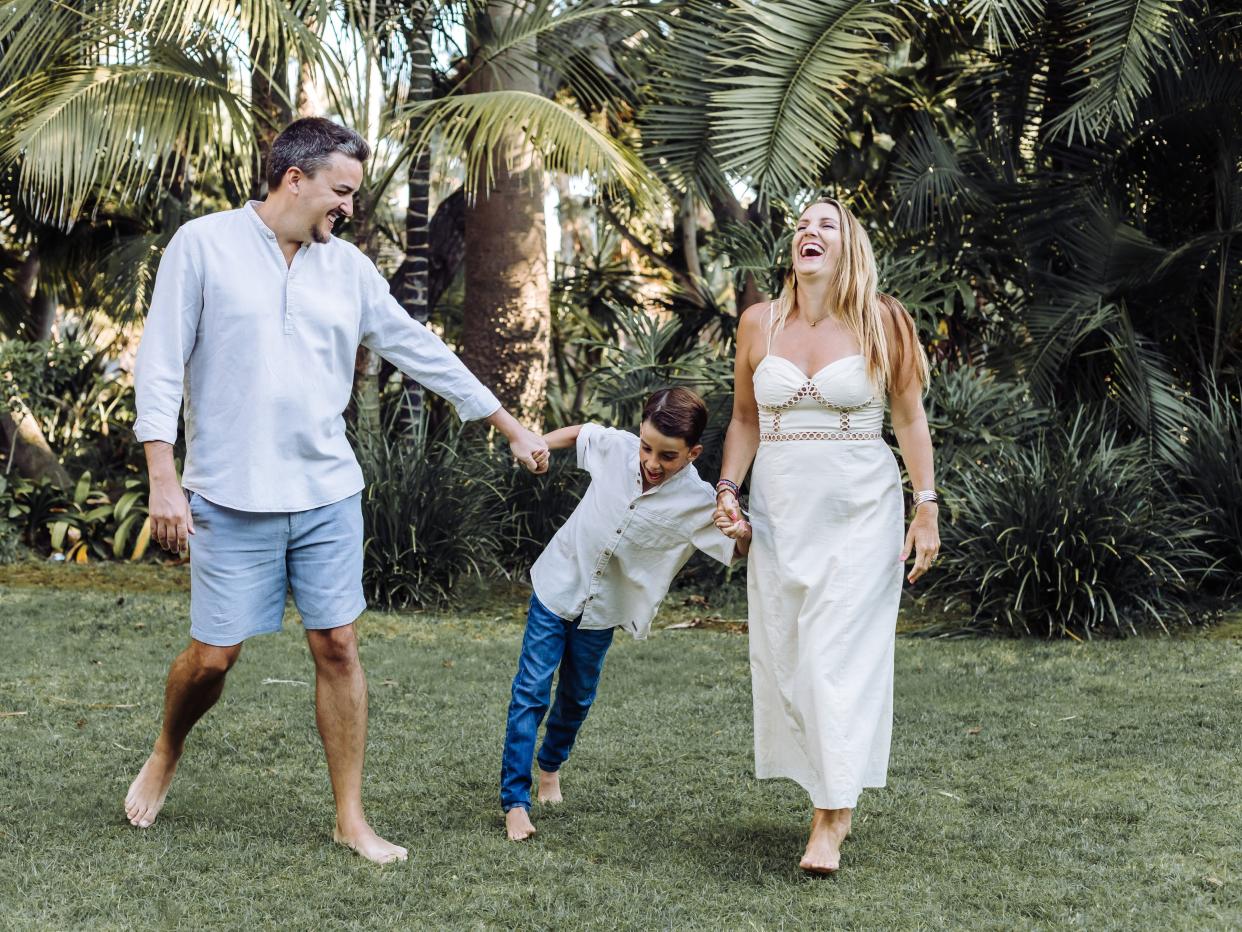I'm an American mom living in Spain. There are no summer camps in August, and everyone tends to travel.

Jennison Grigsby, an American mom and yoga teacher, moved to Spain nine years ag.
She is raising her bicultural son, Luca, with her Spanish husband.
Grigsby values Spain's affordable and diverse summer camps and the strong community.
This as-told-to essay is based on a conversation with Jennison Grigsby, an American mom and yoga teacher who lives in Valencia, Spain. It's been edited for length and clarity.
I've been living in Spain for nine and a half years. I met my husband about 11 years ago when I was taking a little sabbatical from life. We decided to move to Valencia temporarily, thinking we would return to the US after a couple of years, but we ended up loving it so much that we decided to stay.
My husband is from Valencia, so we have his family here. We're well-connected in the local and expat communities, making us feel at home.
We have an almost 9-year-old son named Luca. Although he's half-American, he's very Spanish. He's lived in Spain his entire life and really connects with the culture. All his friends are Spanish, and he spends a lot of time with his Spanish side of the family, who help us out a lot.
We go back to the US as a family at least once a year, usually during summer break, and every other year, we also go for Christmas. We're heading to California soon for a couple of weeks.
When we return from the States, Luca will attend two different summer camps. The first is with the Valencia Football Club (soccer), where he trains for a week but comes home every night. Then, once that's done, he'll attend an indoor soccer camp.
I love that most schools in Spain offer affordable on-site summer camps
Compared to the US, I found that most schools in Spain offer on-site summer camps at a low cost, focusing on sports and art activities. In the US, summer school is more academic, often used to catch up on subjects or get ahead for the next year. Then there are summer camps, which typically last a week but can be expensive.
In Spain, summer camp options include on-site school camps with sports and arts, sleepaway camps, or day camps without overnight stays. Kids start going to sleepaway camps in the summer for one to two weeks when they're a bit older, usually around 10 to 12. Some parents find it exciting that their kids can go off on their own for a bit. The challenging part is that there are usually no camps in August, so we have a full month with fewer options. That's when most families choose to travel.
I find it quite nice that there are many different options for summer camp hours in Spain. Camps usually start at 9 a.m. and you can choose to have your child stay until 1 p.m., 3 p.m., or 5 p.m. The regular school schedule in June and September is also modified due to the heat, offering the same options. As a parent, you can decide the time you want your child to finish, and you pay for the extra hours, which include childcare, lunch, and activities.
Kids are separated by age at school, and have little overlap
My husband and I had our eye on a well-known Catholic school even though we're not religious because it's a big traditional Spanish school, and we wanted Luca to be exposed to more people, more sports, and more activities. It might be overwhelming for some children, but I love its strong community feel. The school has around 90 students per grade, divided into three classes of 30, and it accommodates kids from ages 3 to 18.
I like that different age groups are kept separate to minimize interactions and ensure younger kids aren't negatively influenced by older students. All the students are at school together; they see each other at some of the community events, but they're still able to stay in their age group. For example, the "infantil" students (ages 3 to 5) have their own entrance and exit, and primary school kids are kept together as a group so they don't cross paths with the older children. I find this careful organization creates a safe environment for younger kids, reducing the chances of bullying.
My son learns the local dialect at school
The school system we chose is called "concertado," a middle ground between public and private schools that are more like religious charter schools in the US, where families pay something. One reason we were attracted to these was its balanced language instruction. In public schools, around 70 to 80% of subjects have traditionally been taught in Valenciano, while kids speak Spanish on the playground and have English classes. In concertado schools, only about 25% of classes are in Valenciano, such as social studies and religion.
For families with no background in Valenciano, public schools can be challenging since it's hard to help their children with schoolwork in a language they don't know. Fortunately, my husband could help Luca with Valenciano.
For us, 95% of Luca's life is in Spanish. He speaks English only with me or when talking to my parents and other family members on FaceTime. At home, my husband and I speak English so that Luca can hear adult conversations in English, and most of his TV is in English. As a baby, his first language was English since I was home with him for the first three years. Once he started school, Spanish became dominant, but I constantly remind him to speak to me in English to help him practice and maintain his bilingual skills, and also so we can connect on a deeper level.
Read the original article on Business Insider

